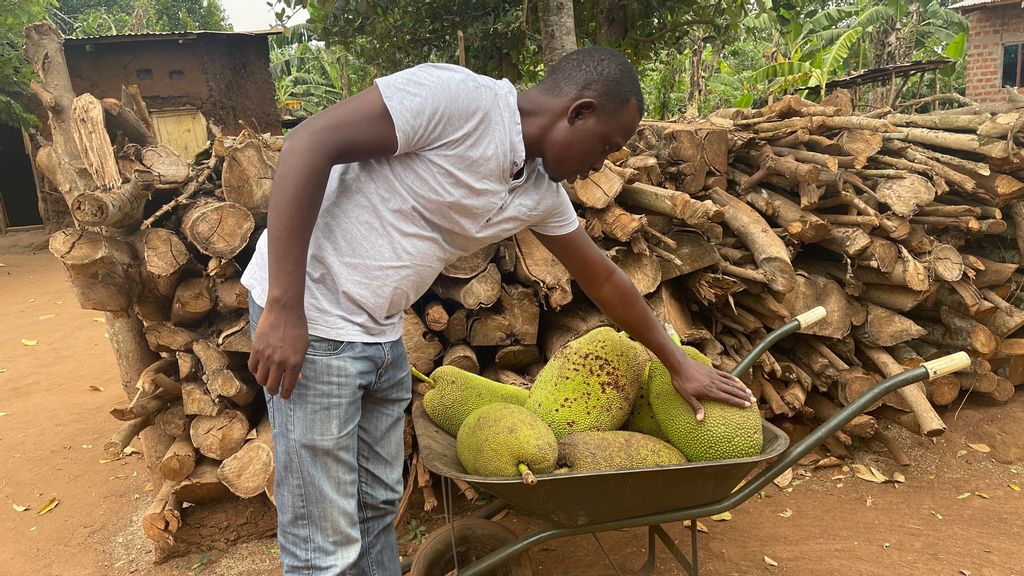The Little-Known Jackfruit Trade Is Earning Rural Ugandan Farmers Nearly 20 Percent Of Yearly Income
By Virginia Van Zandt For rural Ugandans, jackfruit trees are abundant — now farmers are discovering that selling their jackfruits could increase their yearly income by 20 percent. Quresh Fidahusein, the CEO of Zahra Food [...] The post The Little-Known Jackfruit Trade Is Earning Rural Ugandan Farmers Nearly 20 Percent Of Yearly Income appeared first on The Westside Gazette.


For rural Ugandans, jackfruit trees are abundant — now farmers are discovering that selling their jackfruits could increase their yearly income by 20 percent.
Quresh Fidahusein, the CEO of Zahra Food Industries Ltd, saw a golden opportunity for farmers in the jackfruit-rich country to gain entry into a rising global market: jackfruit as a plant-based meat substitute.
The jackfruit is a large fruit with a green rind weighing up to 55 pounds, that when opened has a variety of nutritional elements. The “meat” of the fruit is a fiber-rich food that, when processed, becomes an ideal shredded base for plant-based “pulled pork” or as filling for samosas or sandwiches.
Fidahusein’s company Zahra, a jackfruit and dried fruit processing facility in Uganda’s capital city of Kampala, has penetrated the plant-based meat market in the Netherlands and broken a profit in just one year of production.
The firm, which was founded in 2018, started out by processing dried fruits, but quickly found that they were getting out-competed by West Africa, especially in the mango trade.
The company’s market research found that some Asian countries like Thailand and Malaysia export jackfruits, but only in canned form. Fidahusein saw an opening in the market and decided to take up the fresh jackfruit harvesting and processing business.

To start, Fidahusein began to communicate with farmers to organize jackfruit drives. The first issue was dealing with a common Ugandan taboo that farmers have against selling their jackfruits. Many farmers see the practice of selling jackfruits as a sort of “bad luck,” because the food was a reliable staple in their own diets.
“For farmers, it was kind of like ‘If you sell your jackfruit today, don’t bring your hungry kids over to eat at my house tomorrow’,” said Fidahusein. He would speak with the village elders, ensuring them that the company did not want to take all their jackfruit trees, but only buy a few fruits per tree.
“Once farmers started realizing the profits that came from selling some of their jackfruit, word spread and neighbors asked to be involved too,” said Fidahusein.
Zahra harvested 140 tons of jackfruit, collected from 300 farmers, in 2022. The revenue averaged each farmer an additional $95 in yearly income — nearly 20 percent of the $550 yearly cost of living for rural Ugandan farmers, according to Fidahusein.
“At the end of the day, they’re getting an income out of this thing [jackfruits].” said Fidahusein. “The economics eventually prevailed.”
Due to the abundant nature of jackfruits in Uganda, supply was not an issue, but instead jackfruit quality. Rather than encouraging farmers to simply grow more jackfruits, the quality control managers at Zahra encourage farmers to improve their growing process and track their jackfruit yields, weight, and other data in the company’s app.

“Farmers upload their data offline. Then from the background, I check the dashboard and see what has been done in the field and what has to be corrected and re-communicated back to the farmers,” said Musoke Yekoyada, a quality control manager of Zahra. Yekoyada, who obtained a masters in food science at the elite Makerere University in Kampala, says food production is his passion.
Because Zahra does not yet have its own jackfruit farm, quality control managers like Yekoyada travel from farm to farm, observing the cultivation process and organizing jackfruit drives among 300 farmers.
Kintu Mwanje is a farmer that has been cultivating his land since 1973, when he inherited it from his father. Mwanje produces jackfruits, coffee, and apple-bananas (a hybrid) on his 4-acre farm, which he has endearingly named “Foot Forest.” Mwanje’s generational farm, located in the village of Bukujju some 40 miles northeast of Kampala, produced 42 tons of mature jackfruit in 2022 and aims to produce 100 tons in 2023.
“After a visit to my grandfather’s place, I came back with some jackfruit seeds,” said Mwanje. “I got motivated because my village was growing. I thought, let me plant for the future. Now, with the introduction of using jackfruit for [plant-based] meat, I’m looking forward to growing more jackfruits because that is a big market,” said Mwanje.
After the fruit has been collected from farmers like Mwanje, the jackfruit is sent back to the facility in Kampala to be processed and packaged.

Fidahusein, who has 14 years of experience in brand marketing and business strategy for Colgate, had a heavy hand in designing the packaging for Zahra’s products. Zahra is a young but ambitious company, and the aesthetic graphics on it’s packaging wouldn’t seem out of place at Whole Foods.
The CEO’s marketing process also included creating cheeky names for Zahra’s dried fruit products, like “sassy pineapple,” “pompous jackfruit,” and “snobby papaya.”
The company is looking for a corporate investor who can put in $1 million or more, which will increase production and scalability by 20 times.
Zahra has landed some big deals lately: the company is now officially a supplier of dried fruit and nuts for Ugandan Airlines.
In a separate project, Zahra partnered with Japan International Cooperation Agency Uganda by sourcing ingredients for cereal bars from refugee communities. The project will create sustainable value for displaced refugee groups in Uganda.
Recommended from our partners
The post The Little-Known Jackfruit Trade Is Earning Rural Ugandan Farmers Nearly 20 Percent Of Yearly Income appeared first on Zenger News.
The post The Little-Known Jackfruit Trade Is Earning Rural Ugandan Farmers Nearly 20 Percent Of Yearly Income appeared first on The Westside Gazette.







